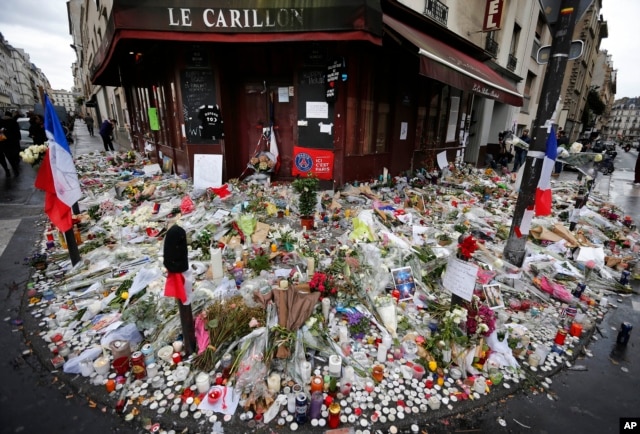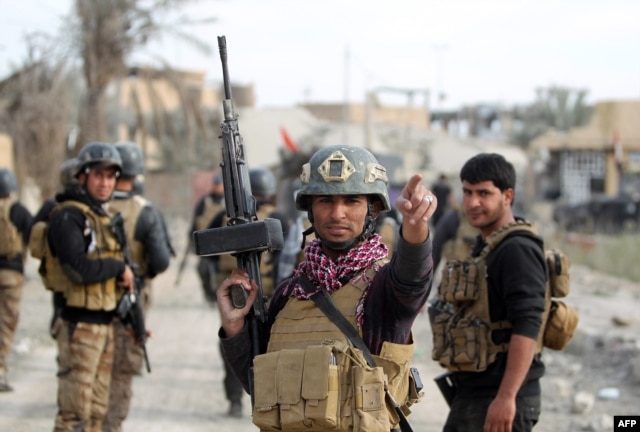Fears Renewed of Islamic State Attacks in Europe, US

Jeff Seldin
Western intelligence agencies are increasingly worried that Islamic State militants will soon find ways to carry out more and increasingly sophisticated attacks on Europe and the United States, using November’s terror attack on Paris as a blueprint.
«2016 is going to be the year where we wish we could get back to 2015,» said Patrick Skinner, a former U.S. intelligence officer now with The Soufan Group, a strategic security intelligence consultancy.
«It’s far too easy for a fighter to go from Raqqa to Europe, and you would think that would be really hard to do,» he said.
Analysts have long warned that the Islamic State had the ability to direct attacks on Western targets from its home base in Syria and Iraq. But they say the Paris attack showed the group was capable of putting that ability into action, using both former foreign fighters and radicalized individuals to kill 130 people in a coordinated fashion.
FILE – Flowers and candle tributes are placed at the Restaurant Le Carillon in Paris, Nov. 19, 2015, after the deadly terror attacks.
Already, French and British officials have warned that the group is actively planning new mass casualty attacks in Europe. One unnamed French senior counterterrorism official told the French news agency that the Islamic State is aiming for a «European 9/11.»
Growing emphasis on external ops
U.S. officials are equally concerned, pointing to the Islamic State’s growing emphasis on external operations as it devotes more people and resources to those missions. The FBI says online calls for attacks against American targets, especially against soldiers and law enforcement, have also continued unabated.
«ISIL’s opportunistic nature goes beyond Iraq and Syria,» a U.S. counterterrorism official told VOA, using an acronym for the terror group. «It’s no surprise that it used its foothold to plot against the West.»
Former CIA Deputy Director Michael Morell warned U.S. lawmakers Tuesday not to underestimate the Islamic State.
«Sometimes it’s really important to listen to what your adversary tells you,» he told the House Armed Services Committee.
«ISIS has told us they’re going to attack us here,» he said, referring to the group by one of its other acronyms. «Unless they are degraded, they will succeed.»
Military defeat not enough
To date, U.S. and coalition forces have launched almost 10,000 airstrikes against Islamic State targets in Iraq and Syria, destroying more than 18,000 targets and killing more than 20,000 fighters.
U.S. military officials also say the group has lost 20 to 30 percent of the territory it once held.
FILE – Members of Iraq’s elite counter-terrorism service secure the central Ramadi’s Hoz neighborhood after Islamic State jihadists abandon their last stronghold in the Anbar province capital, Dec. 27, 2015.
Yet lost fighters have been replaced, counterattacks have been launched and new terror plots are being hatched, leading some to wonder if degrading the Islamic State will be enough.
«A lot of our assumptions are based on that if we defeat them militarily — which is a categorical imperative, we have to do that — that it will result in defeat on the other battlefields of social media and lone wolves and small cells,» Skinner said. «I don’t think that’s accurate. I think the lag time, if they are connected, is going to be a lot longer than we’re going to tolerate.»
Some current U.S. officials are also cautious, saying that even once the Islamic State’s self-declared caliphate is destroyed, it will take an additional effort — a «second war» — to destroy the Islamic State terror group.
«We’re just getting started,» former CIA director James Woolsey told VOA during an interview in November. «We will be seeing ISIS one way or another in Europe, and perhaps in North America, for a long time to come.»



